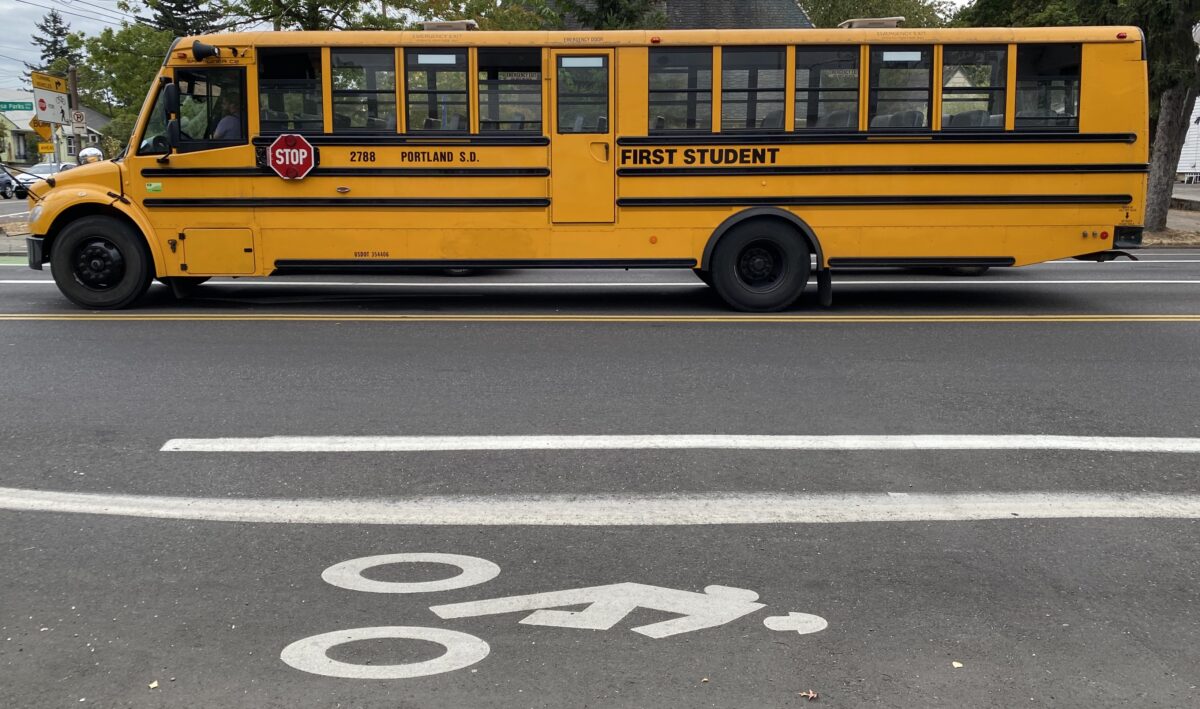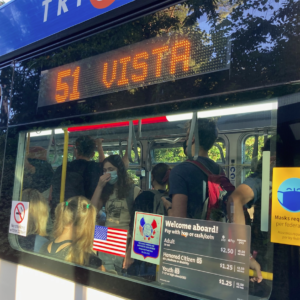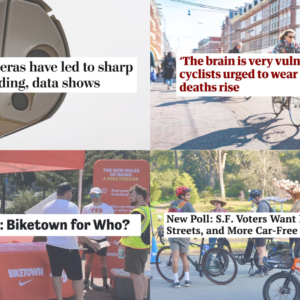
(Photo: Jonathan Maus/BikePortland)
“Riding a bike isn’t even an option.”
— Father of a Benson High senior
TriMet responded to the national bus driver shortage yesterday by raising the starting hourly raise for new drivers from $17 to $21.36/hr. In a bright and upbeat press release, the agency touted its seven-week training program, guaranteed pay increases, and opportunity for advancement. The raise aligns TriMet driver pay with that of First Student, the yellow school bus company, which upped its wage to $22/hr on September 1st. Drivers for both organizations are represented by the Amalgamated Transit Union (ATU) 757.
Earlier this week, BikePortland reported that Portland Public Schools (PPS), which contracts with First Student, had responded to the driver shortage by cutting thirteen routes serving Benson and Lincoln High Schools, the only high schools receiving the bus service. According to PPS, roughly 225 students were affected. Although the cuts did not appear to be causing traffic congestion at the schools, BikePortland reached out to our readers to learn how the disruption might be impacting them. Two families responded, one from Benson, the other from Lincoln.
Benson High School is temporarily located seven miles away at the Marshall High campus for three years while the Benson building is renovated. The father of a Benson student we spoke to, said his son biked to school from 9th to 11th grades. But for his senior year, “riding a bike isn’t even an option,” he shared. “The distance aside, the traffic risks get higher and higher the closer he gets to the Marshall campus.” The family has ended up driving their son to school in the morning, “because [taking] TriMet would be too time-consuming and iffy in the morning,” and he takes a combination of light rail and bus to get home in the afternoon.
Advertisement
The Lincoln family’s situation is tougher. They live in Forest Heights far from TriMet stops, one parent has a disability which prevents them from driving, the other has to work during drop-off times. They have a neighbor who can shuttle their student a few days a week, but as of a couple days ago, they hadn’t arrived at a solution for the remaining days. This parent told me, “I really miss Mayor Vera Katz. Our town has a real need of her kind of leadership.”
The bus driver shortage is national. According to an article published by The Hustle, 40% of the 500,000 buses in the U.S. are owned by privately contracted firms.
The article piqued my curiosity so I looked into the firm PPS contracts with, First Student. FirstStudent is the largest provider of school bus service in the U.S. It was owned by the transport giant FirstGoup PLC, a British conglomerate, until July, when the group sold FirstStudent to EQT Infrastructure, a global private equity firm, for $4.6 billion.
All that money, and they can’t manage to get a kid from Forest Heights to Lincoln High School.

— Lisa Caballero, lisacaballero853@gmail.com
— Get our headlines delivered to your inbox.
— Support this independent community media outlet with a one-time contribution or monthly subscription.





Thanks for reading.
BikePortland has served this community with independent community journalism since 2005. We rely on subscriptions from readers like you to survive. Your financial support is vital in keeping this valuable resource alive and well.
Please subscribe today to strengthen and expand our work.
EQT is Swedish, but in the USA we would call it a hedge fund.
FirstGroup PLC of the UK owns among other companies Greyhound Bus in the USA. FirstGroup is among the big 5 “commercial” transit companies in the world who operate as contractors much of the public transit in the USA. Cities (and universities, airports, and school districts) contract out to these companies who in turn run and maintain the buses, deal with the workers’ unions, negotiate contracts, and so on. You as a rider wouldn’t know it – the drivers and other contracted staff all have on municipal uniforms. TriMet does most of its services in-house, but many major cities like DC and Boston contract out for most of its transit services, including for subway.
Each of the Big 5 transit companies have substantial government support in both subsidies from municipalities but also the form as direct investors in their companies. So FirstGroup PLC and National Express PLC, both in the UK, have as originating major investors the national pension systems of both Scotland and England (both companies were originally government crown corporations before they went “private”.) The other 3 of the BIG 5 are all French – TransDev which is 70% owned by the French government investment company Casse; Keolis which is 70% owned by the French national railway company SNCF; and RAT-P which roughly (English translation) stands for the Rapid Area Transit – Paris (owned by the Paris Metro).
I guess one of my points, which I didn’t overtly state, was to bemoan the financialization of the world. Whether it is Berkshire-Hathaway buying Portland houses, investment groups equitizing paintings, or private equity making good profit off your kid’s bus ride (or their decision to cut your kid because they aren’t profitable enough), we have arrived at a place in which big capital has its tentacles in places which might surprise you.
The profit these quasi-governmental corporations are making is pretty marginal, even if the companies are huge (and they are). The most similar American models would be Amtrak, the Postal Service, or Bonneville Power Administration – none of them are at all like Facebook or McDonald’s. However, the decisions to cut service, raise fees, and routing is typically local – you can rightly blame your school board or municipality, as the case may be.
David, EQT doesn’t look like a hedge fund to me. Different animal.
It’s a Swedish private financial company. Even their website says so. What do you think hedge funds are?
Traders who hedge positions in liquid assets with complex derivative structures.
The American school bus system is something of world oddity. In most other countries school kids ride the same transit system as everyone else. We ended up with this strange parallel transportation for school age kids as a result of our confused transit policy, confused urban planning and confused motivations for k-12 education. Running a completely separate transportation system that only operates a few hours each morning and evening is not very efficient.I am afraid it is a luxury we will not be able to afford much longer.
The Beaverton School District has at least three giant school bus parking lots in an an industrial district of inner Beaverton.
The top 0.001% build rockets so they can get their jollies launching into space while the bottom 99.9% wonder if we can afford yellow bus service for school children. The inequality is grotesque. We can afford a lot more than we think we can.
It’s screwed up in a similar way to US health insurance. That got tied to employment as a result of some WWII era horse trading, look it up, and as a result we have a layer of profit-taking business in the middle of decisions about necessary medical care. This nation pays more for health care than any other, its citizens get less, and weasels set the price of drugs.
Portland doesn’t know if it’s a town or a city. We need transit for sure, but yeah, let’s have yellow school buses too because the city busis too scary for my kid. No, actually it’s probably best is they go in the car because that’s how real people arrive places.
In Germany, kids ride school buses just like here.
Also apparently in Canada, Poland, Ukraine, Russia, and Mexico.
It seems to be popular in countries with free compulsory public education systems and not so popular in countries where private fee-based schools are more common (such as in the UK.)
A surprising number of countries also color their school buses yellow.
https://en.wikipedia.org/wiki/School_bus_by_country
Would you let your 8 year-old ride a Trimet bus alone?
Funny how you don’t look at the PPS budget and ask similar questions. Like, all that money and we still have one of the shortest school years in the country, laughable metrics for gauging student performance and teachers who irrespective of their generous compensation want to hold our kids education hostage for their own personal desires.
Oh and if your willing to follow the bread crumbs as to how the third party PPS contracts bus service with, it would probably also be relevant to ask why we need to do that in the first place. I am willing to be it has something to do with money, and what FirstStudent provides is far cheaper than anything PPS could on their own, so that leaves more money for administration and teachers.
I really want to encourage that Benson family to consider the Max instead of driving their kid. It’s been reliable for my son, and for the many, many Benson kids taking it.